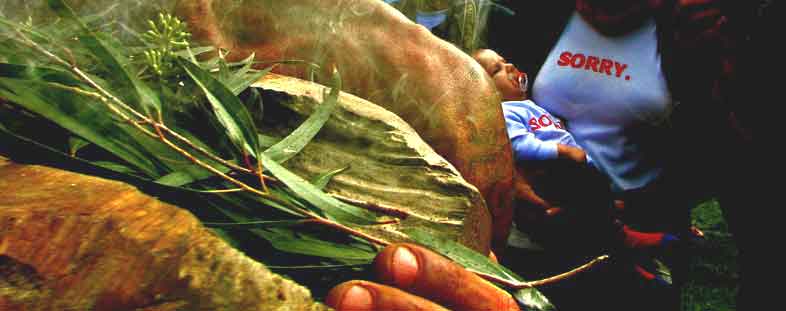
Canberra, February 13, 2008
Over the last eleven and a half years, Australia had been plagued with division between those of substantial wealth and the working class poor and between some non-Iindigenous and Indigenous groups. The last government seemed to have built up a climate of fear and put more effort into battling against the prospect of ‘terrorism’ landing in our shores than on rectifying the scandal of allowing Indigenous people to live in fourth world conditions in an otherwise affluent country.
We succeeded in building a picture overseas of a nation where greed is good, where ‘victims’ — such as refugees, suspect terrorist collaborators, and Aboriginal people who suffer ill health, die in custody, are abused sexually or accused of being the abuser themselves — are simply ‘dysfunctional’. If they were treated badly, they had it coming to them. The so-called ‘Stolen Generation’ was seen as a thing of the past; they should just get over it and move on. No apology was forthcoming from a government who contends that past government policies were misguided but well intentioned. In any case, the former Prime Minister, Mr Howard himself didn’t think that what the previous generation of leaders did was his responsibility.
The Howard government’s response to criticisms and inquiries was an emergency legislation, the infamous Northern Territory (NT) legislation, which treats everyone in communities as suspects, their incomes quarantined, and their situation exempt from human rights legislation which would have otherwise protected them.
Change was on the horizon when the Rudd government was swept into power during last year’s November election and saw the former Prime Minister, John Howard not only lose government but also lose his seat. Kevin Rudd signalled that if he got elected, he was, unlike his predecessor, going to offer Aboriginal people the Government’s apology.
That day is here — 13th February 2008. Many Aboriginal people and their supporters travelled to Canberra from various parts of the country and some from overseas, to witness this historic occasion. I canvassed the feelings of people who were in Canberra on that day, and included my own — from a Filipino Australian who has lived here for nearly thirty-four years.
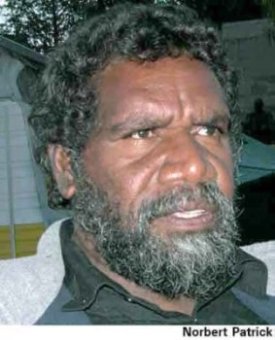
Norbert Patrick, a Walpiri man from the Lajamanu Community, came all the way from the Northern Territory to Canberra to join others in asking the Federal government to reverse the controversial NT legislation. He also wants to see Kevin Rudd, the new Prime Minister say ‘Sorry’ to Aboriginal people. Norbert lives about 67 km from Katherine.
“The Walpiri people still have their own culture, songs, dances, and language, also known as Walpiri. Walpiri is still spoken in five communities: Yuendumu, Nyirrpi, Ali-Curung, Willowra and Lajamanu.
“The NT legislation is discriminatory. Kevin Rudd’s government should abolish it. Instead of tackling all issues, the former Howard government got stuck into one issue. It is not right to mix up all issues [into one]. Alcohol, for example [is a problem]. I have given up drinking for many years now. I don’t touch it now. I work in the Community Development Employment Program (CDEP) in the sports and recreation area. Many jobs in the community such as garbage collection, recycling, night patrol, safe house, nutrition, aged care are funded under CDEP. [It] was scheduled to be phased out by the Howard government.
“The main problem with the NT Legislation was that there was no consultation or discussion with the community. There was no respect shown for Aboriginal people. The Rudd Government should abolish the NT legislation; send out all the various agencies and get ideas from the community. Each community would select its own enterprise [relevant to the community’s needs].”
“As a key principle for change in Indigenous communities”, he said “it is better not to rely on non-Indigenous people.”
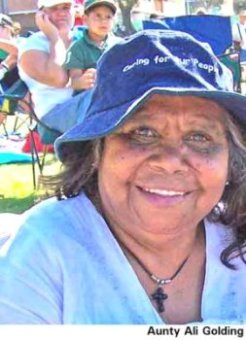
“If you gather up all the sobs today and imagine that all together they form a pool of water, all these tears gathered up represent the beginning of healing for our people.
It’s time for this healing now … so much bitterness and anger in the past. It will be heart and compassion now.
For me, it’s a new beginning, a new history, a renewal of history. It will be a lot of work from this day on.
We need to keep in close contact with Kevin Rudd, and give him encouraging words.
I am starting to write my own autobiography and the timing is perfect … to start my book when Australia is turning a new page in its history.
I’m lucky it’s happening this way. I wonder what the next generation will think in years to come of Rudd’s speech from the heart.”
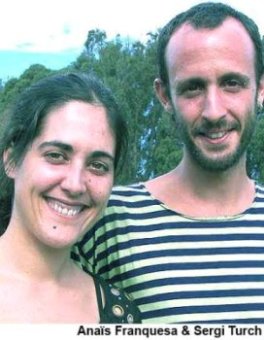
Anaïs: “My brother is living in East Gippsland, Victoria and we came here to visit him. We started to learn a bit about Australian history, and we discovered that the 26th of January is the celebration of Australia Day. We thought about Aboriginal rights. We checked the internet and found out about the Tent Embassy. We came here [to Canberra]. We’ve been here for a few days and we knew that on the 12th of February there was another ‘converge’.”
Sergi: “We were interested in Aboriginal issues before. After here, we will go to Mexico [to be] with the Aboriginal people there. We were searching here about Aboriginal people.”
Anaïs: “… to make the connection.”
Sergi and Anaïs said they are interested in human rights in whichever part of the world. I asked them where their passion for Aboriginal people comes from.
Anaïs: “I was working in NGO —human rights, in Barcelona.”
Sergi: “My passion started when I was in Mexico five years ago and I was already working with Aboriginal people.”
Sergi said he shares the feelings of the elders here.
Anaïs is appalled to find out that Australia has two versions of its history: one claiming a [white] history and another, [a black] history. “I am scandalized to see that there are two histories in Australia,” she said.
Sergi: “I reckon that we really are not scandalized because Spanish people did the same in South America. Colonization is always the same. When you look at it directly from the people who suffer, you feel disheartened.”
Anaïs: “The previous government can’t say it wasn’t their fault [referring to the Howard government’s refusal to apologise to Aboriginal people] because the Northern Territory legislation that they passed was exactly the same.
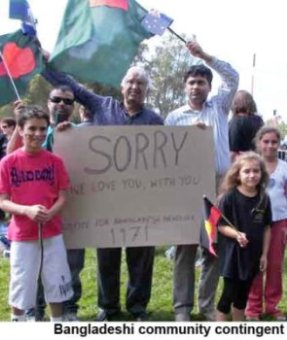
“We have expected this ‘Sorry’ from the leadership for a long time. We migrated here. It was a shame that the leadership couldn’t say ‘Sorry’.
After a long struggle from different parts of the country, — Aboriginal people and others who migrated here — in the end, we have now achieved the Declaration given by the leadership. We are really proud of it.
People calling me from overseas say to me, “You know, your leadership doesn’t say ‘Sorry’ to the Aboriginal people, they belong to this country. They own this country. They [the Australian government] should say ‘Sorry’.” Now I can tell my friends all over the world and in Bangladesh that, yes, the leadership now says ‘Sorry’ to the Aboriginal people and that it will honour [their] rights.”
“So it is really quite a happy day for us [to see] that the leadership has apologised to the Indigenous people. I join this gathering on behalf of the Bangladeshi community … some couldn’t come here. We came here with some friends from Sydney in solidarity with the current leadership of the Australian Government.”

“Like others beside me, looking at the big screen and listening to Kevin Rudd on that historic occasion, I was deeply moved by the acknowledgment of wrong doing from the lips of the Prime Minister of Australia on behalf of the Australian Government and Parliament.
Devoid of ideological and political point scoring, his speech which he himself wrote, has made us all proud that Australia has been able to retrieve her human face.
And now, we new settlers can begin to feel truly accepted as Australians.
Now I believe that the colour bar which I intuitively feel still operates and works against us, will start to fade away.
The former leadership made us feel that we live in a deeply divided country. And now, what I see is a beacon of hope, a concerted effort to right the wrong, and an opportunity to show respect for our first peoples and embrace the sanctity of the land which we all share.”
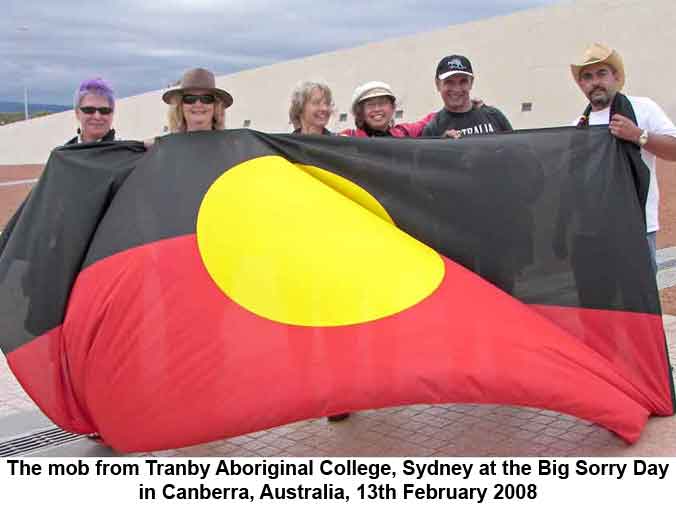
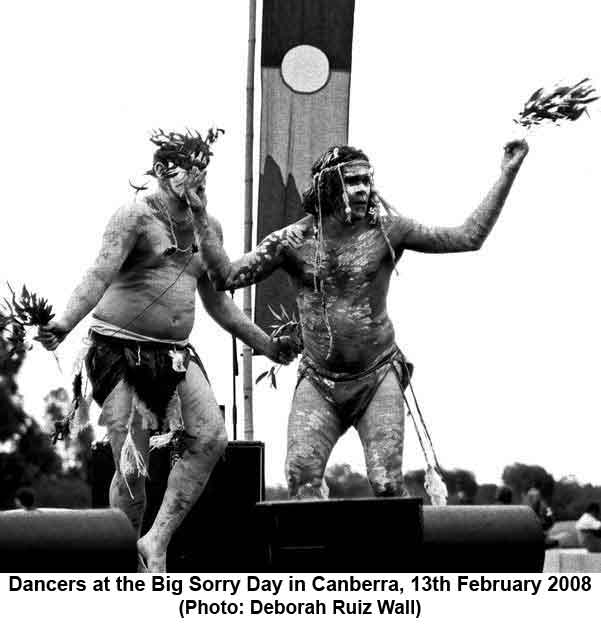

 Home | Aims and Objectives of Solidarity Philippines Australia Network | About Kasama
Home | Aims and Objectives of Solidarity Philippines Australia Network | About Kasama 
Search the SPAN Web